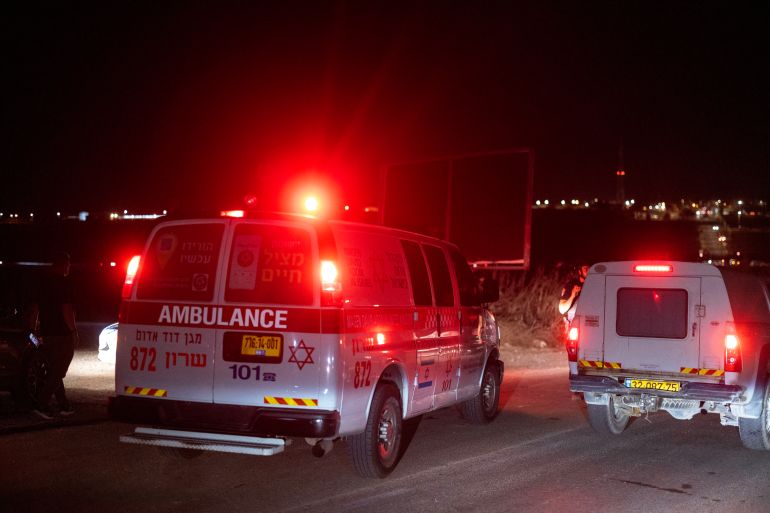More than 60 wounded in Hezbollah drone attack on Israeli military site
Hezbollah says it launched a ‘swarm of drones’ at an Israeli military camp in Binyamina, northern Israel.
An ambulance arrives at the site of a drone strike near the northern Israeli town of Binyamina [Oren Ziv/AFP]Published On 13 Oct 202413 Oct 2024
At least 67 people have been wounded in a drone attack in northern Israel, according to Israeli emergency services and local media, as the Lebanese armed group Hezbollah said it had targeted an Israeli military camp with a “swarm” of drones.
Israeli Army Radio reported that at least four people were critically wounded in the attack on Sunday in the town of Binyamina, south of Haifa.
According to Israel’s Channel 12, no warning sirens were heard before the attack.
Hezbollah claimed responsibility for the strike. In a statement, the Iran-aligned group said it launched a “swarm of drones” at a Golani Brigade camp.
The Golani Brigade is one of the five infantry brigades of the regular Israeli army and regarded as an elite unit.
Members of Israel’s security forces secure the site of a drone strike near the northern Israeli town of Binyamina [Oren Ziv/AFP]
In a separate statement, Hezbollah said it also targeted the Israeli Tsnobar logistics base in the Israeli-occupied Golan Heights with a missile.
The Hezbollah drone strike comes on the same day that the United States announced it would send a new air-defence system to Israel to help bolster its protection against missile attacks.
At the direction of US President Joe Biden, US Defense Secretary Lloyd Austin “authorised the deployment of a Terminal High-Altitude Area Defense (THAAD) battery and associated crew of US military personnel to Israel to help bolster Israel’s air defenses following Iran’s unprecedented attacks against Israel on April 13 and again on October 1”, Pentagon press secretary Pat Ryder said in a statement.
Reporting from Amman, Jordan, Al Jazeera’s Nour Odeh said that though the Israeli air defence system is very sophisticated and multi-layered, drones are hard to detect.
“Usually, the sirens go off when something is heading towards a location so civilians and residents of that area are told to seek shelter. That’s why there have been a very small number of injuries throughout the past year from those attacks,” she said.
“But the drones are harder to detect, and because they fly at lower altitudes, they are much more difficult to intercept. Effectively intercepting them would put a lot of people in danger,” Odeh said.
Sunday’s attack comes as Israel intensifies its offensive against Hezbollah in Lebanon.
The conflict between Israel and Hezbollah escalated a year ago when the Lebanese group began firing rockets at northern Israel the day after Israel launched its assault on Gaza. Israel has sharply escalated the fighting in recent weeks, carrying out air raids across Lebanon and sending ground troops into the south of the country.
More than 2,100 people in Lebanon have been killed since last October, the majority in the last few weeks since Israel intensified its attacks, and more than 1.2 million people have been displaced, according to Lebanese authorities.
The Hezbollah attack in Binyamina shows that attacking Lebanon carries a heavy price for Israelis too, according to Gideon Levy, Israeli political analyst.
“Nothing less was expected. We are at the beginning of the war in Lebanon, not at the end of it. And everyone so enthusiastic about this war should know that it will carry a very heavy price,” he told Al Jazeera.
Hezbollah has said it will continue attacking Israel in solidarity with the Palestinian people in the Gaza Strip and in support of their “valiant and honorable resistance”, and in “defence of Lebanon and its people”.
